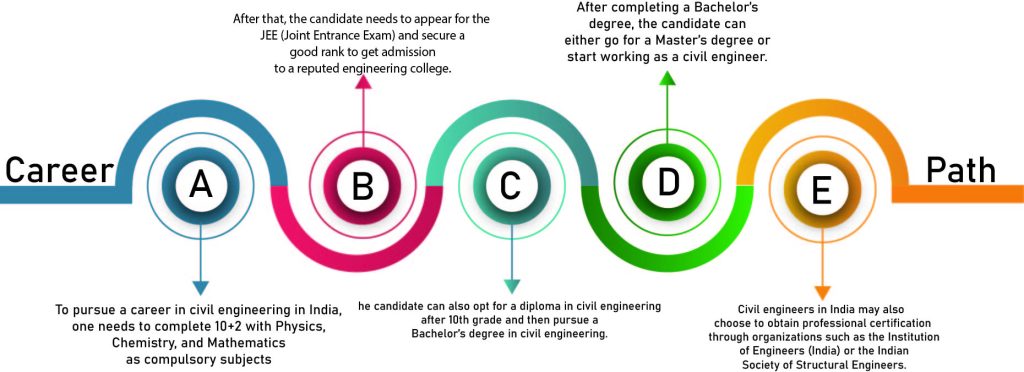Civil engineering is a branch of engineering that deals with the design, construction, and maintenance of the built environment, including structures such as buildings, bridges, roads, and water supply and wastewater systems. Civil engineers use their knowledge of mathematics, physics, and materials science to develop solutions to complex engineering problems. They play a vital role in shaping the world we live in, from designing sustainable infrastructure to ensuring the safety of the public.

Work description
The work of a civil engineer typically involves designing, planning, and overseeing the construction and maintenance of various structures and infrastructure projects.
They analyze data and develop plans and specifications for construction projects, ensuring that they meet safety, environmental, and budgetary requirements.
Civil engineers also supervise construction sites, ensuring that the work is being done according to the plans and specifications. They may work on a variety of projects, from large-scale infrastructure such as highways and airports to smaller projects such as buildings or water treatment plants.
Additionally, civil engineers may work with government agencies, private companies, or as consultants to provide technical expertise and advice.
High Demand
Job stability and security due to constant demand for civil engineering projects.
Lucrative salaries
Opportunities for career advancement and specialization within the field.
Opportunities for innovation
The ability to work on projects that have a tangible impact on society and the environment.
Versatility
Competitive salaries and benefits packages.
Flexibility
Possibility of working in diverse settings, such as construction sites, offices, and laboratories.
Job satisfaction
Collaboration with other professionals, such as architects and environmental scientists.
High stress
Long working hours, especially during project deadlines or emergencies.
Long hours
High level of responsibility, as mistakes in design or construction can have serious consequences.
Competitive field
Exposure to hazardous materials and environments, such as construction sites or contaminated areas.
Constant learning
Potential for high levels of stress, particularly during complex or large-scale projects.
Isolation
Limited opportunities for creativity, as designs and plans often need to adhere to strict safety and regulatory standards.
Eye strain and other physical health issues
Constant need to stay updated with new technologies and techniques, which may require ongoing education and training.
The cost of pursuing a career in civil engineering in India can vary depending on several factors, such as the type of institution and degree program chosen, location, and living expenses.
However, on average, the cost can range from approximately INR 4-6 lakhs for a Bachelor’s degree program in a government institution to around INR 10-15 lakhs for a private institution. Pursuing a Master’s degree in civil engineering can cost around INR 1-3 lakhs in a government institution and INR 5-10 lakhs in a private institution.
Additional expenses, such as housing, food, and transportation, can also vary depending on the location and lifestyle choices. Scholarships, grants, and financial aid may be available to help offset the costs of pursuing a career in civil engineering in India.
[wpcharts type=”horizontalbarchart” bgcolor=”red:gray:yellow,blue:gray:yellow,random:gray:yellow,purple:gray:yellow” min=”0″ legend=”true” titles=”2 year , 5 year” values=”3,7,5,12″]
The earning potential of a civil engineer in India can vary depending on several factors such as experience, job profile, location, and the sector of employment.
On average, a civil engineer in India can earn a starting salary of around INR 3-6 lakhs per year. With experience, the salary can increase to around INR 8-15 lakhs per year, and senior-level civil engineers can earn salaries of around INR 20-30 lakhs per year.
Civil engineers employed in government organizations may earn slightly lower salaries, while those working in private companies, consulting firms, or construction companies may earn higher salaries.
In addition to the base salary, civil engineers may also receive bonuses and benefits such as health insurance, retirement plans, and paid time off.
[wpcharts type=”horizontalbarchart” bgcolor=”red:gray:yellow,blue:gray:yellow,random:gray:yellow,purple:gray:yellow” min=”0″ legend=”false” titles=”Entry-Level, Mid-Career, Senior-Level ” values=”5,15,25,35,45,55″]
Strong foundation in mathematics, physics, and other sciences.
Excellent problem-solving skills and ability to think creatively.
Attention to detail and ability to work with complex information.
Good communication skills and ability to work in a team.
Strong technical skills, including proficiency in computer-aided design (CAD) software and other engineering tools.
Ability to work under pressure and meet deadlines.
Dedication to safety and commitment to ethical and professional standards.
Poor time management skills and procrastination.
Lack of attention to detail or careless mistakes.
Inadequate knowledge or interest in mathematics and sciences.
Difficulty working in a team or communicating effectively with others.
Inability to work under pressure or handle stressful situations.
Unwillingness to continue learning and staying up-to-date with new technologies and techniques.
Work-life balance
The work-life balance of a civil engineer can vary depending on the employer, the specific job role, and the project requirements.
Civil engineers may be required to work long hours or weekends to meet project deadlines or address emergencies. However, some employers offer flexible work arrangements, such as telecommuting or flexible hours, which can provide more work-life balance.
Civil engineers may also have the option to work on part-time or freelance basis, which can offer more flexibility and control over their work schedule.
Overall, a civil engineer’s work-life balance can be balanced with careful time management, effective communication with colleagues and clients, and setting realistic expectations for workloads and project timelines.

Improved infrastructure, such as roads, bridges, and buildings, which enhances mobility and accessibility for people and goods.
Enhanced public safety through the design and construction of buildings, bridges, and other infrastructure that can withstand natural disasters and other hazards.
Increased access to clean water and sanitation through the design and construction of water treatment plants, sewage systems, and other related infrastructure.
Reduced environmental impact through the development and implementation of sustainable practices and technologies that minimize the negative effects of construction on the environment.
Creation of job opportunities for individuals at various skill levels, which can contribute to economic growth and development.
Contribution to the growth of cities and towns, which can promote social interaction, cultural exchange, and the development of communities.
Structural Engineering
Design and analysis of structures such as buildings, bridges, and tunnels to ensure they can withstand environmental and other external factors.
Geotechnical Engineering
Design and analysis of earth structures and foundation systems, including retaining walls, dams, and slopes.
Environmental Engineering
Design and analysis of environmental systems, such as water treatment plants, air pollution control systems, and waste management facilities.
Transportation Engineering
Design and analysis of transportation systems, such as roads, highways, railways, and airports.
Construction Engineering and Management
Planning, organizing, and overseeing construction projects to ensure they are completed on time, within budget, and to the required quality standards.
Conclusion:
- In conclusion, civil engineering is a rewarding and challenging career choice that offers many opportunities for personal and professional growth. It plays a critical role in the development of infrastructure, cities, and towns, and contributes to the safety, health, and well-being of society. Pursuing a career in civil engineering requires a strong foundation in mathematics, sciences, and engineering principles, as well as the ability to think critically and creatively, work effectively in teams, and communicate effectively with colleagues and clients. With the right education, training, and experience, individuals can build a successful and fulfilling career in civil engineering and make a meaningful impact on the world around them.



